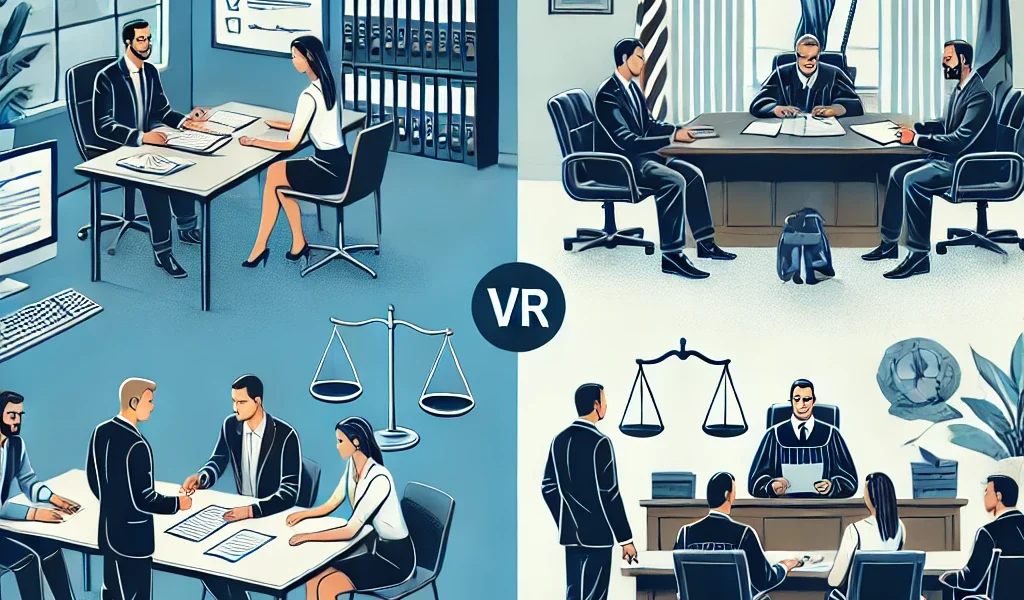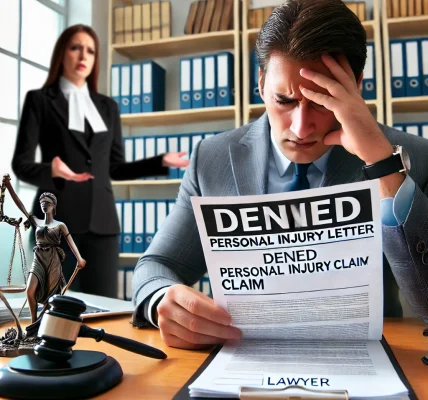Introduction
When someone suffers an injury due to another party’s negligence, they often seek compensation for their damages. However, many people are confused about the difference between a personal injury claim and a personal injury lawsuit. While both involve seeking compensation, they differ in their legal processes, timelines, and outcomes.
Understanding the difference is crucial for making informed decisions about your case. In this guide, we’ll explore personal injury claims vs. lawsuits, explaining how they work, their key differences, and which option may be best for different situations.
What is a Personal Injury Claim?
A personal injury claim is a formal request for compensation made to the at-fault party’s insurance company. This is usually the first step after an injury occurs. The goal of a claim is to negotiate a fair settlement without going to court.
Key Aspects of a Personal Injury Claim
- Filed with the insurance company of the at-fault party.
- Negotiation-based process between the claimant and the insurance adjuster.
- Does not involve a courtroom or judge.
- Typically resolved faster than a lawsuit.
- Less expensive since it avoids court costs and prolonged legal fees.
- If successful, results in a settlement rather than a court verdict.
Common Types of Personal Injury Claims
- Car accident claims (filed against the at-fault driver’s insurance).
- Slip and fall claims (filed against a property owner’s insurance).
- Medical malpractice claims (filed against a healthcare provider’s insurance).
- Product liability claims (filed against a manufacturer for defective products).
How the Personal Injury Claim Process Works
- Injury Occurs: The victim suffers harm due to another party’s negligence.
- Medical Treatment & Documentation: The injured party seeks medical attention and gathers evidence.
- Claim is Filed: A demand letter is sent to the at-fault party’s insurance company.
- Investigation by the Insurance Company: The insurer reviews the claim, medical records, and accident details.
- Negotiations Begin: The insurance company may offer a settlement, which the claimant can accept, reject, or negotiate further.
- Settlement or Denial: If both parties agree, a settlement is reached. If denied or unfairly low, a lawsuit may be necessary.
What is a Personal Injury Lawsuit?
A personal injury lawsuit is a formal legal action filed in court when a claim does not result in a fair settlement. Unlike a claim, which involves negotiations with an insurance company, a lawsuit involves legal proceedings before a judge or jury.
Key Aspects of a Personal Injury Lawsuit
- Filed in court against the at-fault party.
- Involves legal arguments presented before a judge or jury.
- May result in a trial if a settlement is not reached.
- More time-consuming than a claim, often taking months or years.
- Can result in higher compensation but with greater risk.
When Should You File a Lawsuit Instead of a Claim?
- If the insurance company denies your claim.
- If the settlement offer is too low.
- If liability is disputed.
- If your damages are extensive, such as long-term disability or wrongful death.
How the Personal Injury Lawsuit Process Works
- Filing a Complaint: The injured party (plaintiff) files a formal lawsuit in court.
- Pre-Trial Discovery: Both sides exchange evidence, including witness testimonies and medical records.
- Settlement Negotiations Continue: Even after filing, parties may still reach an out-of-court settlement.
- Trial: If no settlement is reached, the case goes to trial, where a judge or jury decides the outcome.
- Verdict and Compensation: If the plaintiff wins, the court awards damages; if they lose, they receive nothing.
- Appeals Process: Either party may appeal if they believe the ruling was incorrect.
Key Differences Between a Personal Injury Claim and a Lawsuit
| Factor | Personal Injury Claim | Personal Injury Lawsuit |
|---|---|---|
| Process | Negotiation with an insurance company | Legal proceedings in court |
| Timeline | Faster, usually a few weeks to months | Longer, often months to years |
| Cost | Lower, fewer legal fees | Higher, due to court costs and attorney fees |
| Decision Maker | Insurance adjuster | Judge or jury |
| Outcome | Settlement | Court ruling (verdict) |
| Risk Level | Lower, since settlement is voluntary | Higher, as there’s a chance of losing in court |
| Compensation Potential | May be lower | Potentially higher if successful |
Which Option is Right for You?
Choose a Personal Injury Claim If:
✅ Your injuries are minor to moderate. ✅ Liability is clear and undisputed. ✅ The insurance company is offering a fair settlement. ✅ You prefer a quicker resolution without court involvement.
Choose a Personal Injury Lawsuit If:
✅ Your injuries are severe or long-term. ✅ The insurance company denies your claim or offers an unfairly low settlement. ✅ Liability is unclear or disputed. ✅ You want the potential for higher compensation.
How a Personal Injury Lawyer Can Help
A personal injury attorney can help determine whether a claim or lawsuit is the best approach for your case. Their role includes:
- Evaluating the strength of your case.
- Negotiating with insurance companies for a fair settlement.
- Representing you in court if a lawsuit is necessary.
- Ensuring you meet legal deadlines (statute of limitations).
- Maximizing your compensation.
Most personal injury lawyers work on a contingency fee basis, meaning they only get paid if you win your case.
Conclusion
While both personal injury claims and lawsuits aim to secure compensation for injuries, they follow different legal paths. A claim typically resolves faster through negotiations, while a lawsuit involves court proceedings and can lead to higher compensation but at a greater risk.
If you’re unsure which option is best, consulting with a personal injury lawyer can provide clarity. Making the right choice ensures you get the compensation you deserve while avoiding unnecessary legal battles.
Disclaimer: This article is for informational purposes only and does not constitute legal advice. Always consult a qualified attorney for legal guidance regarding your specific situation.




